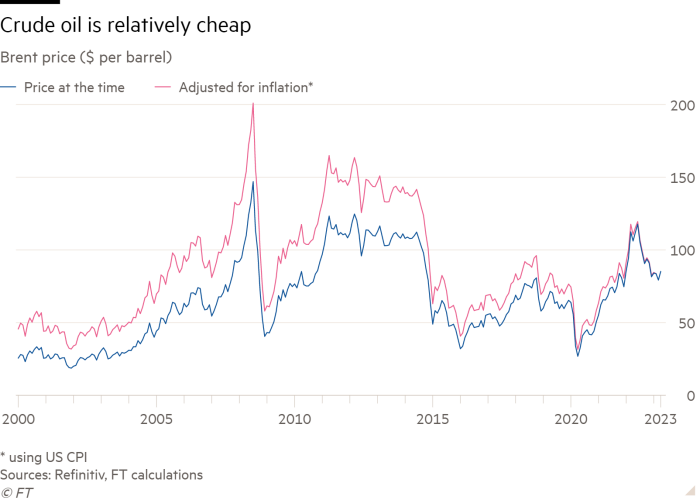[ad_1]
As a historic value crash in crude introduced turmoil to the worldwide economic system three years in the past, Donald Trump led a broad effort by western international locations to persuade Saudi Arabia and Russia to slash output and prop up the oil market. The Opec+ cuts that emerged spared the US shale sector from collapse. Trump praised Riyadh and Moscow for his or her assist.
Three years on, such co-operation has evaporated. The Kremlin’s warfare in Ukraine has led Europe to purge Russian power from its economic system, whereas G7 international locations search to dictate the value Moscow earns from its oil. Hovering crude costs final yr deepened a rift between Riyadh and the US administration of Joe Biden, who entered workplace pledging to make Saudi Arabia a “pariah”. In October, the White Home accused Opec+ of “aligning with Russia” after it moved to slash oil provides.
The disintegration was seen once more this week, when Riyadh and its Opec+ allies shocked the oil market by pledging to chop much more crude from provide — an effort to shore up oil costs regardless of swirling worries in regards to the international economic system’s well being.
The shock from the cartel was a “watershed” second, says Greg Priddy, a marketing consultant on the US-based Spout Run Advisory in Washington, with financial and political significance past oil markets.
Extra upward stress on oil costs — simply as power prices had begun to ease in western economies — will complicate central banks’ efforts to chill inflation, say analysts, pitting the US Federal Reserve towards Opec+.

And if the producer group succeeds in protecting oil costs increased for longer, it could additionally compromise western international locations’ efforts to limit the circulate of petrodollars into the Kremlin’s warfare chest.
Above all, the newest cuts reveal but extra volatility within the geopolitics of power. In an period that many strategists believed can be marked by falling oil demand and the retreat of petrostates similar to Saudi Arabia and Russia, energy is flooding again to Riyadh.
“Saudi Arabia is now ready to endure strains with Washington in pursuit of their very own financial self-interest,” says Helima Croft, head of commodities for RBC Capital Markets. “Opec is again within the driver seat. It’s arrange for a market the place the Saudis are calling plenty of the pictures.”

However the dangers for the Saudis and the worldwide economic system are excessive in the event that they push it too far.
“We’ve excessive inflation, economies probably going into recession, and this can be a state of affairs the place you want decrease oil costs for a brief time period for the economic system to get well,” says Adi Imsirovic on the Oxford Institute for Vitality Research (OIES), who as soon as ran oil buying and selling at Russia’s Gazprom.
“If central banks are now not in a position to lower charges in the identical manner, then Opec+ might be accountable for dragging the entire world economic system right into a recession.”
One fell swoop
Opec+ cuts have a tendency to come back after hours and even days of negotiation. This week’s got here from nowhere — one other shock from a Saudi power minister, Abdulaziz bin Salman, who has developed a penchant for throwing curve balls on the oil market. The power minister is the half-brother of Crown Prince and Prime Minister Mohammed bin Salman, the nation’s de facto ruler.
With one fell swoop, Abdulaziz additionally managed to confound these speculators who had guess on falling oil costs after the current banking disaster sparked new fears in regards to the international economic system.

Oil costs jumped after Saudi Arabia and allies, together with the UAE, Iraq and Kuwait, introduced cuts totalling greater than 1mn barrels a day, or about 1 per cent of worldwide demand, rising above $85 a barrel from $79 a barrel earlier than the announcement.
Even earlier than the cuts have been introduced, Wall Avenue analysts and forecasters such because the Worldwide Vitality Company and Opec had anticipated provides to fall in need of hovering demand by summer season, delivering a value surge within the second half of 2023.
Now the query is that if Opec’s shock lower will elevate costs too shortly for the well being of a fragile international economic system, particularly as central bankers proceed their quest to tame inflation.
“There’s a tremendous line of uncertainty,” says Amy Myers Jaffe, a professor at New York College. Elevating costs now, whereas many poorer client international locations are already fighting debt and a robust greenback, “runs the danger of main the world into a bigger monetary disaster . . . the place excessive oil costs irritate different destabilising elements and, bingo, we see a collapse of the whole lot together with oil costs”.
Others suppose Saudi Arabia is betting the world economic system can shoulder costlier oil, particularly as China’s economic system reopens. Saudi Arabia is acutely aware about stunting demand, however believes a value of as much as $120 is tolerable, says Amrita Sen, head of analysis at Vitality Facets.
She thinks the value rise this week was primarily pushed by merchants seeking to cowl quick positions, however expects a a lot stronger value surge later within the yr.
In the meantime, producer international locations are additionally feeling the influence of upper inflation and are attempting to spice up their very own revenues in response, argues oil hedge fund supervisor Pierre Andurand. And crude stays comparatively low-cost, Andurand argues.

In inflation-adjusted phrases, Thursday’s Brent settlement value of $85.12 a barrel would equate to about $73 5 years in the past. The record-high oil value of $147 a barrel in 2008 can be nearer to $200 at the moment.
“In case you take a look at Opec international locations they’re affected by inflation like everybody else — their imports are up rather a lot in greenback phrases,” says Andurand, who has predicted oil costs may hit $140 a barrel this yr. “They’re clearly saying that $80 or $90 a barrel is just too low. It’s prone to be a lot increased than $100 earlier than they react and begin elevating manufacturing.”
Saudi Arabia stated on Sunday that its 500,000 barrels a day of cuts have been “aimed toward supporting the steadiness of the oil market”. However the kingdom additionally wants more cash to pay for the crown prince’s Imaginative and prescient 2030 venture and its so-called “gigaprojects”, similar to the event of the futuristic metropolis Neom on the Pink Sea. Imaginative and prescient 2030 has lengthy been the centrepiece of the crown prince’s plans to reform the dominion, however has struggled to draw worldwide funding.
Prior to now, increased oil costs would have led to authorities largesse. However Riyadh, which diminished subsidies lately, has not reversed a tripling in gross sales tax throughout the peak of the pandemic that was billed as a short lived measure.
“[Energy minister] Abdulaziz’s job is to generate money — to be sure that Saudi will get the very best return on its investments together with from its home oil manufacturing,” says Raad Alkadiri on the consultancy Eurasia Group. “Home ambition trumps the whole lot else below MBS.”
Saudi’s home agenda
Home wants might have pushed the newest Saudi cuts, however the ramifications can be felt far outdoors the dominion. The transfer is extra proof of the breach with Washington — and the depth of Riyadh’s partnership with Moscow.
Because the Saudis and different producers lower crude exports between Could and the tip of the yr, demand for the form of oil bought by Russia will improve, says Roger Diwan, a veteran Opec-watcher at S&P International Commodity Insights.
This might push costs for Russian seaborne exports above the $60-a-barrel value cap imposed by the G7, immediately benefiting the Kremlin, consider some analysts.
“It is a mega reward to Putin as Russia is bleeding economically and militarily and out of the blue you give them an additional $10 a barrel on the oil value,” says Imsirovic, of OIES. “It’s a present for which the remainder of the world is paying.”

It is going to additionally deepen the disenchantment with Saudi Arabia in Washington, the place the Biden administration spent months on shuttle diplomacy final yr to influence Riyadh to extend oil provide to chill hovering costs. In October, when the cartel introduced an earlier spherical of cuts as a substitute, the White Home accused Opec+ of “aligning with Russia”.
However the irritation is mutual. The Biden administration’s local weather change focus has not gone down effectively in oil capitals, particularly when coupled with calls for for extra crude provide after the invasion of Ukraine. Nor did the US’s choice to launch thousands and thousands of barrels of oil from its Strategic Petroleum Reserve final yr in an effort to decrease petrol costs.
“You’ve gotten a way more unbiased course taken by the Saudis politically,” says Diwan. US affect over Saudi oil coverage has now “gone” he says.
Because the US’s shale revolution peters out, in the meantime, Opec+ now not fears a surge in manufacturing from Texas if costs rise, giving the cartel freedom to chop provides, say analysts.
Saudi Arabia might also really feel it has the US in a nook. Riyadh’s deepening relationship with China means there may be concern in Washington about “dropping” Saudi Arabia to Beijing if the US pushes again too arduous on oil coverage.
However, on the identical time, some coverage analysts consider focusing too arduous on competitors with China is blinding the US to the affect it nonetheless has over Riyadh, notably in arms gross sales and army assist.

There was little observe by means of in October when senior Democrats vowed repercussions on the dominion after it slashed oil provide. Abdulaziz, the power minister, brazenly gloated within the months that adopted that the US had been improper to chastise them as oil costs remained comparatively regular.
“The US handled them with child gloves [in October] and actually shouldn’t have,” says Priddy, of Spout Run Advisory. “They’ve received F-15s that may’t be saved within the air with out US technicians. Behind closed doorways we don’t must be well mannered about it.”
Though the administration’s response to the newest cuts has been muted, the tensions can be seen once more if oil costs rise again in the direction of $100 a barrel or the economic system slips right into a recession. The Biden administration is acutely conscious that top pump costs are an electoral legal responsibility.
“There’s a perception in Saudi Arabia that the US gained’t create a serious kerfuffle over increased oil costs, except they actually get uncontrolled,” says Eurasia Group’s Alkadiri. “However once you’re enjoying with a worldwide superpower that may come again to chew you.”
Extra reporting by Samer Al-Atrush in Dubai
[ad_2]
Source link

